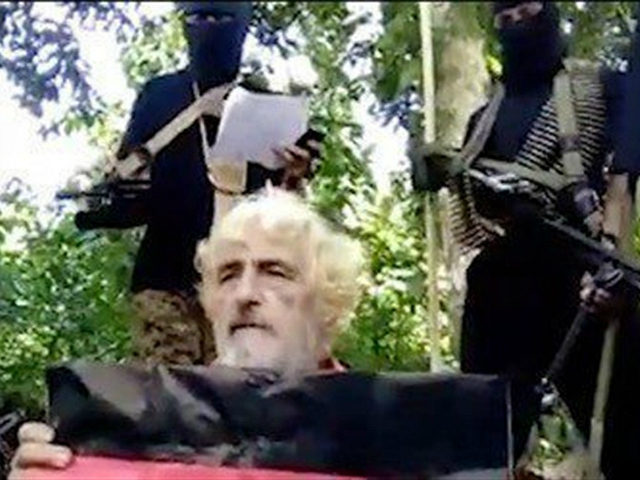In confirming the death of Jurgen Kantner, the hostage to the Islamic State affiliate Abu Sayyaf beheaded overnight Sunday, the Philippine government revealed that multiple soldiers had died to prevent his murder, but their rescue attempts failed.
That revelation surfaced in remarks from Jesus Dureza, identified as a chief hostage negotiator for Manila. “Up to the last moment, many sectors including the Armed Forces of the Philippines exhausted all efforts to save his life. We all tried our best. But to no avail,” he told reporters.
In an official statement, the Armed Forces of the Philippines (AFP) confirmed that they suffered losses on failed missions to save Kantner. “Our operations in the past several days and nights using all our resources were unrelenting. We lost some of our best men in the process, because we value the life of Mr. Kantner and that of the others who have fallen prey to this terrorist group,” the statement read.
In addition to the Dureza statement, Foreign Secretary Perfecto Yasay reportedly told Reuters that Kantner might have been ill, hence the beheading, though the government had also refused to pay a demanded $600,000 ransom by the allotted deadline on Sunday.
The Abu Sayyaf group posted a video to social media late Sunday of Kantner’s beheading, showing some jihadis watching the beheading while chanting “Allahu Akbar,” the common rallying cry of Muslim terrorists. Reuters notes that Abu Sayyaf is currently holding at least 26 hostages, 19 of them foreign nationals.
Abu Sayyaf pledged allegiance to Islamic State “caliph” Abu Bakr al-Baghdadi in 2014. As the Stratfor intelligence agency argues in a piece published Tuesday, however, that pledge of allegiance has done little to change the way the group operates: as a largely decentralized coalition of gangs in the Southern Philippines.
The advantage to the Islamic State moniker, however, is attracting greater funding. “By adopting the Islamic State’s moniker and mimicking some of its tactics, [Abu Sayyaf leader Isnilon] Hapilon and other jihadist leaders in the Philippines have gained legitimacy, along with notoriety, as part of a well-known, transnational movement.” The agency adds that Abu Sayyaf has also continued its kidnapping trade with much success, generating $7 million in 2015.
President Rodrigo Duterte has repeatedly vowed to eradicate Abu Sayyaf and warned that Middle Eastern jihadists may make their way into the Philippines once ISIS loses its foothold in Iraq and Syria, aware of the presence of an affiliate in the nation. “Once the terrorists of the Middle East are deprived of the land area, the real estate area where they can sleep… They will wander to other places and they will come here and we have to prepare for that,” Duterte warned in November.
In the same remarks, Duterte asserted that he would not respect the concept of “human rights” in fighting Abu Sayyaf. “These guys, they do not have an iota of what is human rights, believe me,” he said. “I will not just simply allow my people to be slaughtered for the sake of human rights; that’s bullshit.”
In January, Duterte announced a new initiative to eradicate the Islamic State affiliate from southern Mindanao, his home island, which would consist of significant military activity. Duterte gave the AFP six months to eradicate the group from the Philippines entirely and asserted he would not hesitate to kill hostages to vanquish jihadis: “‘What about the hostage?’ Sorry, collateral damage.”

COMMENTS
Please let us know if you're having issues with commenting.